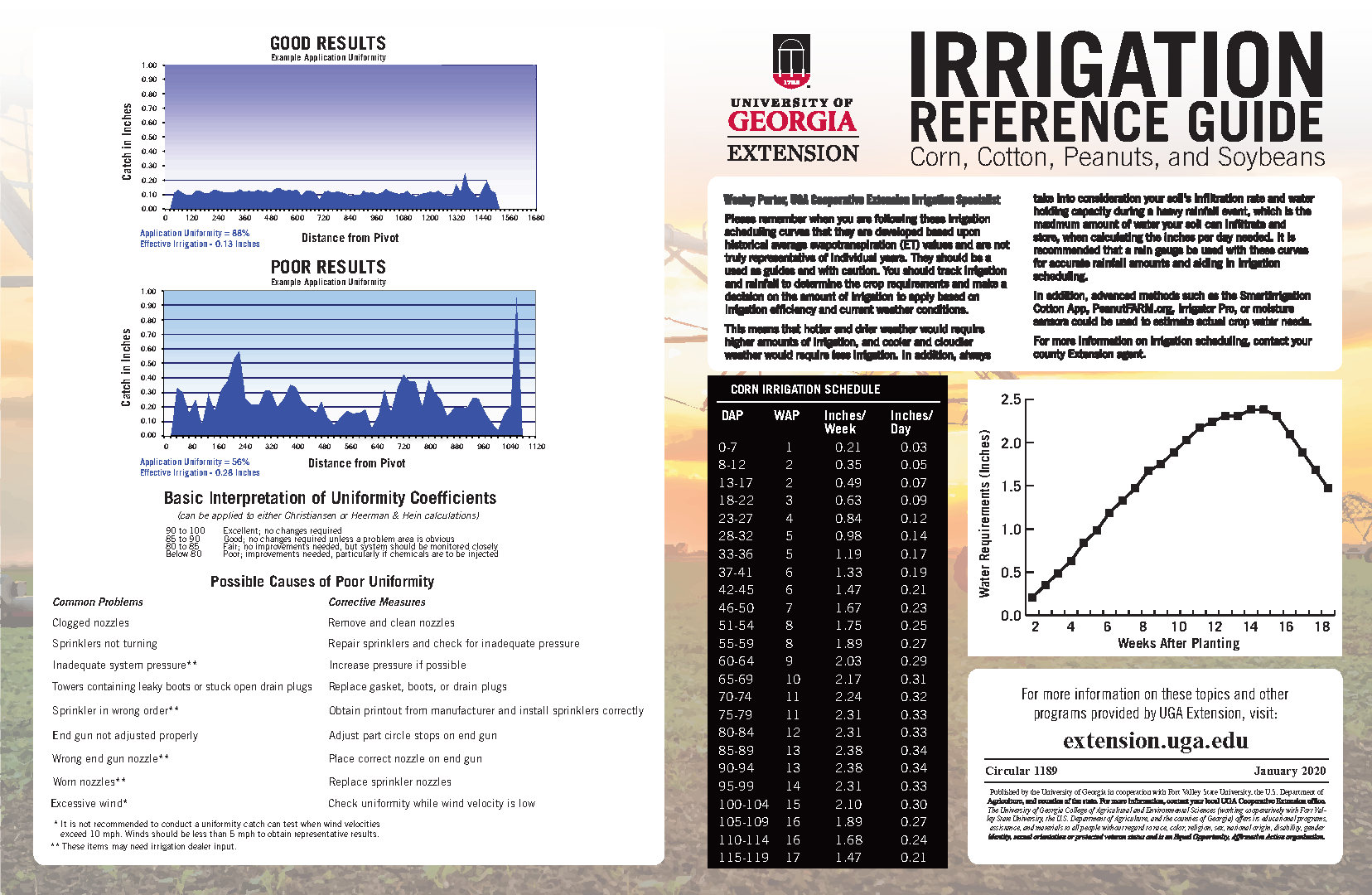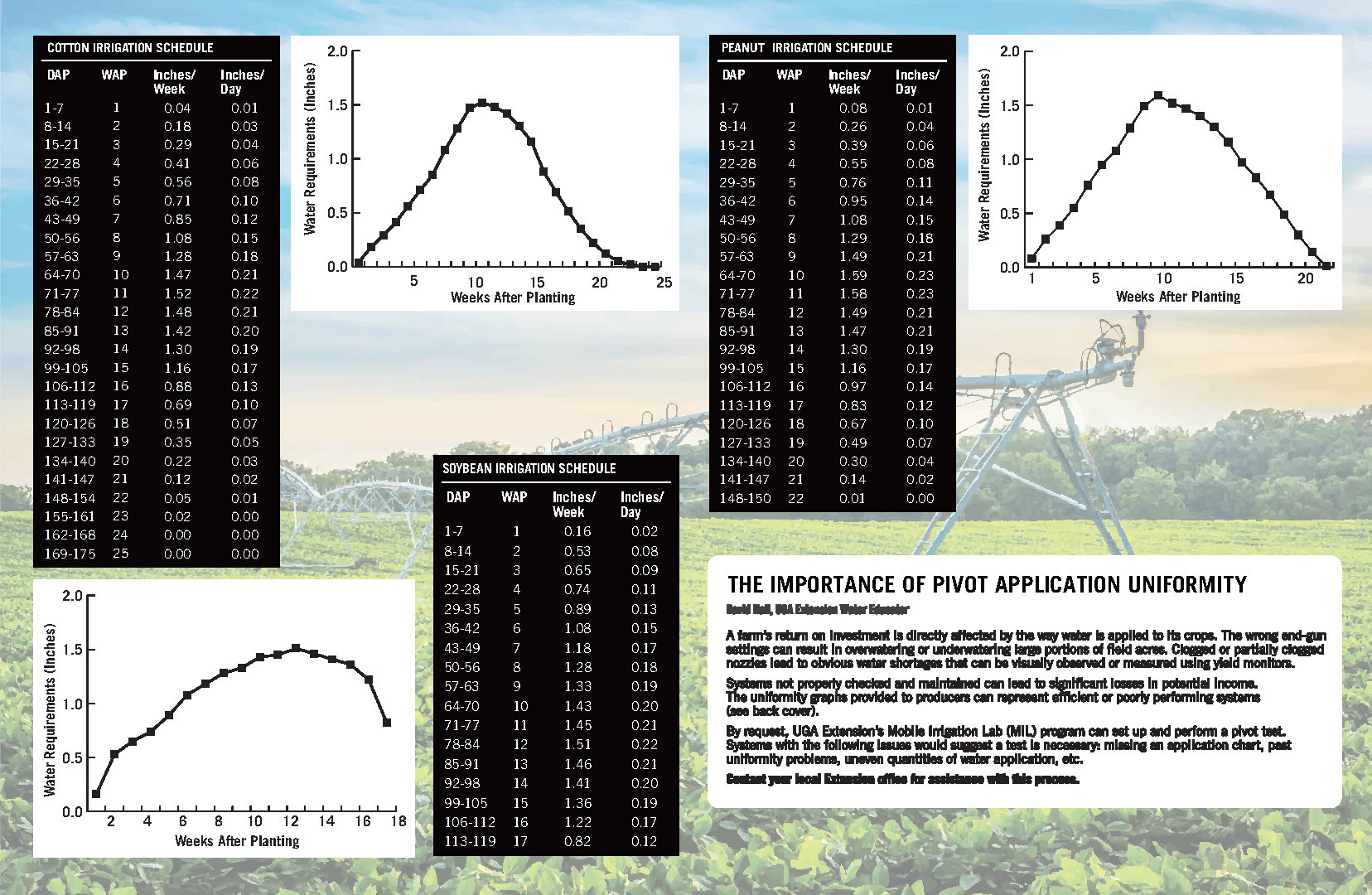- Hall, David
Summary
Farmers who irrigate row crops need a quick reference guide that is durable, covering multi crops and will aid in irrigation scheduling. The irrigation guide I produced and distributed aided in farmers irrigating their crops more efficiently and producing more profit.
Situation
Georgia row crop farmers’ ability to irrigate with center pivots is critical in being successful. Using a method of irrigation scheduling will assist in profitability by the efficient use of water and maximizing crop potential. According to the Georgia Environmental Protection Division located in Tifton, Georgia, as of May 2020 there were approximately 23,712 active withdrawal permits for Agricultural purposes. The same office reported a minimum of 24,048 center pivots applying water to an excess of 1,635,461 acres. Row crops require different amounts of water as they grow and mature. Growing multiple crops in combination with various ages can become confusing on a crop’s water needs and timing. UGA Extension specialists have produced crop production guides for each of the major row crops grown in Georgia. UGA Extension researched and tested these checkbook methods of irrigation scheduling to aid in maximizing crop yield with the least amount of applied irrigation water. The issue is carrying the correct guide book to each pivot when scheduling and applying irrigation water. Finding and turning to the pages for irrigation recommendations proved to be cumbersome and time consuming for the farmer, leading to no scientific means of irrigation scheduling and using water wisely.
Response
As a UGA Extension Water Educator, I saw the need for farmers to have a durable, waterproof, multi-crop and easy to carry, quick irrigation reference guide. I collaborated with Dr. Wesley Porter to put together a corn, cotton, peanut and soybean quick reference checkbook method irrigation guide. I also incorporated narrative regarding the importance of pivot application uniformity and issues that may cause poor uniformity and possible corrective suggestions. It also promoted the free UGA Extension Mobile Irrigation Lab to come out and test pivots for uniformity. The guide was reviewed and approved for publication by UGA Extension Agents, Specialist, and faculty. Sixty-seven UGA Extension Agents, with irrigation in their county, were contacted to obtain an accurate count for distribution to applicable farmers. The irrigation guide was also made available at https://extension.uga.edu/publications/detail.html?number=C1189 for anyone to download also.
Impact
Once printed, 1,695 copies were distributed to the respective county Agents. Agents were then able to visit farms and distribute them with a quick tutorial on how to use the guide. The checkbook method of irrigation scheduling is the easiest and cheapest method to use, especially for farmers who may not be tech savvy. I have received numerous calls from Agents requesting additional copies because their farmers are using them and dispersing them to employees who assist with irrigation. I feel confident that a minimum of 20% (327,092 acres) of the irrigated acres in Georgia are being irrigated using the recommendations from the quick irrigation reference guide. Another 16% (261,674 acres) utilizing moisture sensors, use this method in conjunction with the guide to supplement their decisions. The sensor can advise when to irrigate but the guide advises you on the amount needed for that particular week of the growing season. By using the guide, farmers are applying water more efficiently and utilizing our water resources more wisely than blindly irrigating without any sense of actual water needed to produce a great crop. The narrative regarding the importance of pivot uniformity generated calls from seven different producers asking for a Mobile Irrigation Lab performed on their system. Six hundred forty-five acres were tested for uniformity. I was able to point out weak areas in the systems leading to using and applying water more efficiently.
State Issue
Sustainability, Conservation, & the Environment
Details
- Year: 2020
- Geographic Scope: State
- County: Bleckley
- Location: College Station, Athens
-
Program Areas:
- Agriculture & Natural Resources


